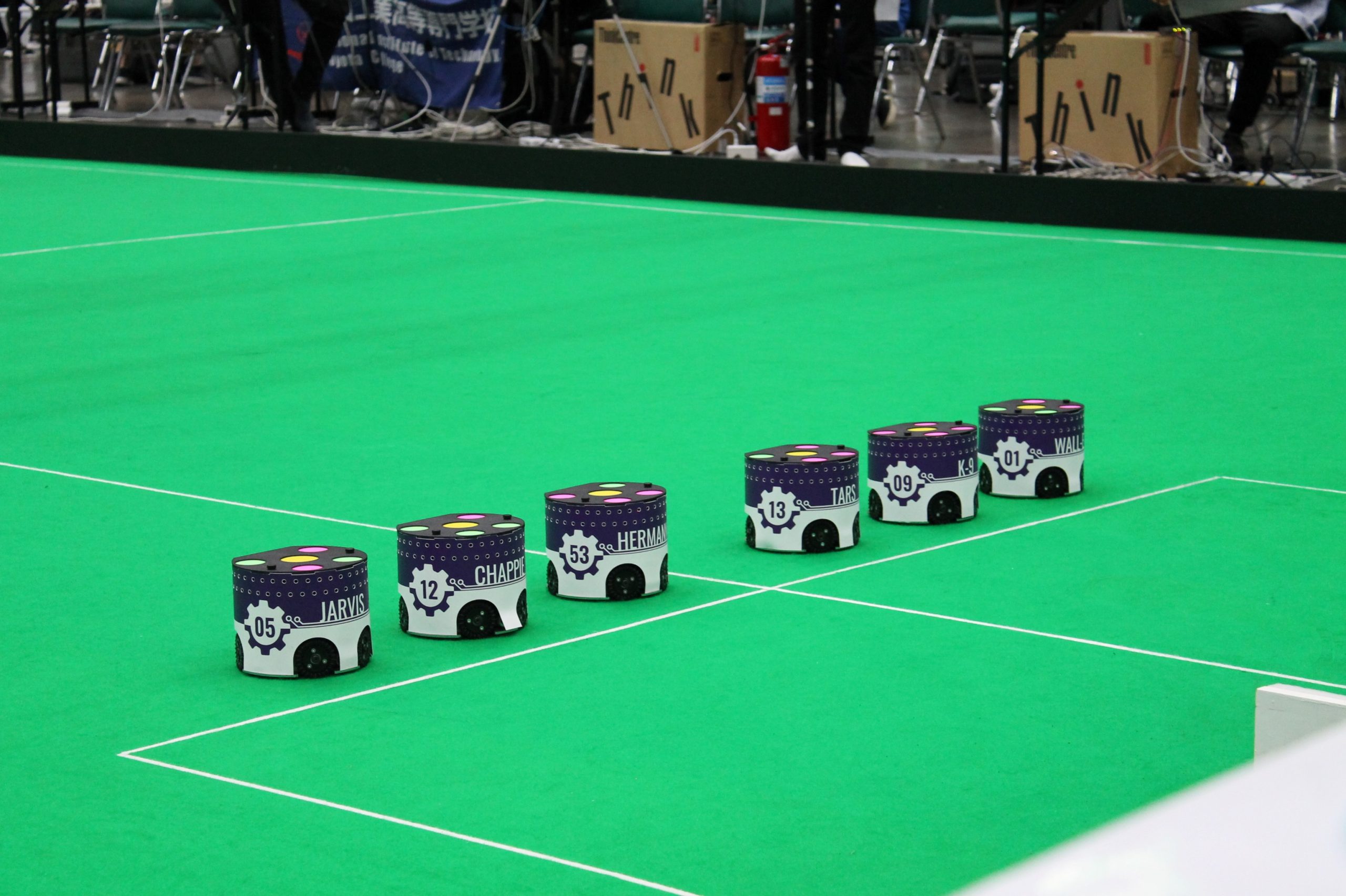TU Delft was the only TU that did not have a RoboCup football team till now. Tim Verburg, Team Manager of the recently established Delft Mercurians tells their story.
The football robots from the RoboTeam Twente are ready for the start at the World Championships in Bangkok in 2022. (Photo: RoboTeam Twente)
Why is there a RoboCup team only now?
“Nobody ever started one before. There was once a team of PhD candidates and professors, but that only lasted a year. Martin Klomp, Coordinator for the Robotics minor and master, got the ball rolling last year. When he was a student he worked in a simulation team at the University of Groningen and was determined to set up a team at TU Delft.
There are now 12 student members who came from the Robotics Student Association. Our goal is to have 16 members. The Robotics, Computer Science and Aerospace Engineering courses are well represented.”
Everyone’s welcome
These studies are very useful. The robots need to be designed, built and programmed. This calls for a multidisciplinary approach. But the team is not only looking for expertise, Tim emphasises. It is an excellent place to learn things that you do not yet already know. Anyone that wants to develop their skills can join the Delft Mercurians.
The Delft Mercurians need six robots if they are to take part in the Small Size League B division. Each may be up to 15 centimetres high and 18 centimetres wide. The football field is six by nine metres. The robots play with a bright orange golf ball which is easily visible for the camera above the field that records everything. The images are sent live to the software that controls the robots.
Once the starting signal is given, the job of the team members is largely done. Their work is to ensure that the robots are optimally built and programmed before that. Human intervention is not permitted during the match as only the referee can hand out penalties and penalty kicks. The teams can ask for a time out in which they can quickly adjust a poorly functioning footballer or a bit of code.
Building robots takes time and money. How do you manage?
“Up to now it has not taken that much time. We all do this part-time. I spend a couple of hours a week on it in my role as the Team Manager. Many other teams, such as the one from the University of Twente, take a year out and do this full-time.
This may be the case here in the future. We received a good sum of sponsoring money in March from the Robotics Institute. That was what really made this possible. We are also approaching other partners. We are doing so for both financing and knowledge so that we can brainstorm with them about ideas and challenges.”
The competition have worked for years on perfecting their robots. How will you catch up?
“We are in close contact with the Twente team that has been at the top for years. They have been around for a very long time and continuously work on improving their old robots. They can always make them that little bit better, but this limits their freedom. It is not easy for them to start doing something completely new. This gives us, as a new team, opportunities.
We have an Unhinged Ideas page – literally. We write completely crazy ideas on it. Can we build jumping robots? Or robots that are stuck to the ground with suction pads? We are starting from scratch, unlike our competitors. I would not want to change places with them. Starting from scratch is what makes it fun.”
How much progress have you made?
“We hope our first test platforms will be ready in two months, so it’s going quite fast. It does not need to be the final design as it is just so that the software team has something to start testing. We will then continue developing the robots. We are also working on building and programming, so everything runs in parallel.
We want to compete in the World Championship in Eindhoven in 2024. We hope to be able to run trials in a few open competitions before that. In any case, in July we are going to this year’s World Championship in Bordeaux to see what the competition is doing. One good thing about the RoboCup is that all the teams publish their work, whether or not they go to a competition, so you can always see what the other teams are doing.”
The website states that the objective of the RoboCup is to ultimately launch a robot team that will win the World Championships in 2050. Is it only about winning?
“Oh no. The organisation team behind the RoboCup works hard on education. And this is also the case for us. We want to offer students the opportunity to develop in robotics on top of their studies. We would like to be there on open days at TU Delft or visit primary schools to show them the great things we do and to give them the chance to operate the robot themselves!”
- Do you want to become a member? Check the Delft Mercurians’ website or email contact@delftmercurians.nl.



Comments are closed.